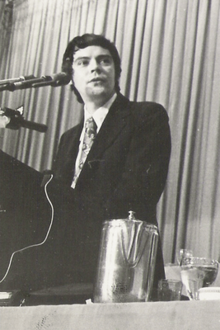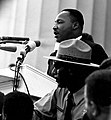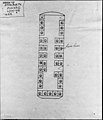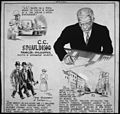Portal:Civil rights movement
The civil rights movement portal The civil rights movement was a social movement and campaign from 1954 to 1968 in the United States to abolish legalized racial segregation, discrimination, and disenfranchisement in the country. The movement had its origins in the Reconstruction era during the late 19th century and had its modern roots in the 1940s. After years of direct actions and grassroots protests, the movement made its largest legislative gains in the 1960s. The social movement's major nonviolent resistance and civil disobedience campaigns eventually secured new protections in federal law for the civil rights of all Americans. The social movement's span of time is called the civil rights era. After the American Civil War and the subsequent abolition of slavery in the 1860s, the Reconstruction Amendments to the United States Constitution granted emancipation and constitutional rights of citizenship to all African Americans, most of whom had recently been enslaved. For a short period of time, African-American men voted and held political office, but as time went on Blacks were increasingly deprived of civil rights, often under the racist Jim Crow laws, and African Americans were subjected to discrimination and sustained violence by White supremacists in the South. Over the following century, various efforts were made by African Americans to secure their legal and civil rights, such as the civil rights movements of 1865–1896 and 1896–1954. The movement was characterized by nonviolent mass protests and civil disobedience following highly publicized events such as the lynching of Emmett Till. These included boycotts such as the Montgomery bus boycott, "sit-ins" in Greensboro and Nashville, a series of protests during the Birmingham campaign, and a march from Selma to Montgomery. At the culmination of a legal strategy pursued by African Americans, in 1954 the Supreme Court struck down the underpinnings of laws that had allowed racial segregation and discrimination to be legal in the United States as unconstitutional. The Warren Court made a series of landmark rulings against racist discrimination, including the separate but equal doctrine, such as Brown v. Board of Education (1954), Heart of Atlanta Motel, Inc. v. United States (1964), and Loving v. Virginia (1967) which banned segregation in public schools and public accommodations, and struck down all state laws banning interracial marriage. The rulings played a crucial role in bringing an end to the segregationist Jim Crow laws prevalent in the Southern states. In the 1960s, moderates in the movement worked with the United States Congress to achieve the passage of several significant pieces of federal legislation that authorized oversight and enforcement of civil rights laws. The Civil Rights Act of 1964 explicitly banned all discrimination based on race, including racial segregation in schools, businesses, and in public accommodations. The Voting Rights Act of 1965 restored and protected voting rights by authorizing federal oversight of registration and elections in areas with historic under-representation of minority voters. The Fair Housing Act of 1968 banned discrimination in the sale or rental of housing. (Full article...) Selected article - The Southern Poverty Law Center (SPLC) is an American 501(c)(3) nonprofit legal advocacy organization specializing in civil rights and public interest litigation. Based in Montgomery, Alabama, it is known for its legal cases against white supremacist groups, for its classification of hate groups and other extremist organizations, and for promoting tolerance education programs. The SPLC was founded by Morris Dees, Joseph J. Levin Jr., and Julian Bond in 1971 as a civil rights law firm in Montgomery. In 1980, the SPLC began a litigation strategy of filing civil suits for monetary damages on behalf of the victims of violence from the Ku Klux Klan. The SPLC also became involved in other civil rights causes, including cases to challenge what it sees as institutional racial segregation and discrimination, inhumane and unconstitutional conditions in prisons and detention centers, discrimination based on sexual orientation, mistreatment of illegal immigrants, and the unconstitutional mixing of church and state. The SPLC has provided information about hate groups to the Federal Bureau of Investigation (FBI) and other law enforcement agencies. Since the 2000s, the SPLC's classification and listings of hate groups (organizations that "attack or malign an entire class of people, typically for their immutable characteristics") and anti-government extremists are widely relied upon by academic and media sources. The SPLC's listings have also been criticized by those who argue that some of the SPLC's listings are overbroad, politically motivated, or unwarranted. The organization has also been accused of an overindulgent use of funds, leading some employees to call its headquarters "Poverty Palace". (Full article...) General imagesThe following are images from various civil rights movement-related articles on Wikipedia.
Related portalsWikiProjectsSelected biography - Tom David Kahn (September 15, 1938 – March 27, 1992) was an American social democrat known for his leadership in several organizations. He was an activist and influential strategist in the Civil Rights Movement. He was a senior adviser and leader in the U.S. labor movement. Kahn was raised in New York City. At Brooklyn College, he joined the U.S. socialist movement, where he was influenced by Max Shachtman and Michael Harrington. As an assistant to civil rights leader Bayard Rustin, Kahn helped to organize the 1963 March on Washington, during which Martin Luther King Jr. delivered his "I Have a Dream" speech. Kahn's analysis of the civil rights movement influenced Bayard Rustin (who was the nominal author of Kahn's "From Protest to Politics"). (This article, originally a 1964 pamphlet from the League for Industrial Democracy, was written by Kahn, according to Horowitz (2007, pp. 223–224). It remains widely reprinted, for example in Rustin's Down the Line of 1971 and Time on two crosses of 2003.) (Full article...) Selected image - During the Civil Rights March on Washington, D.C. — Leaders marching from the Washington Monument to the Lincoln Memorial, (August 28, 1963).
Did you know?
TopicsSubcategoriesThings to doAssociated WikimediaThe following Wikimedia Foundation sister projects provide more on this subject:
Discover Wikipedia using portals
|






















































